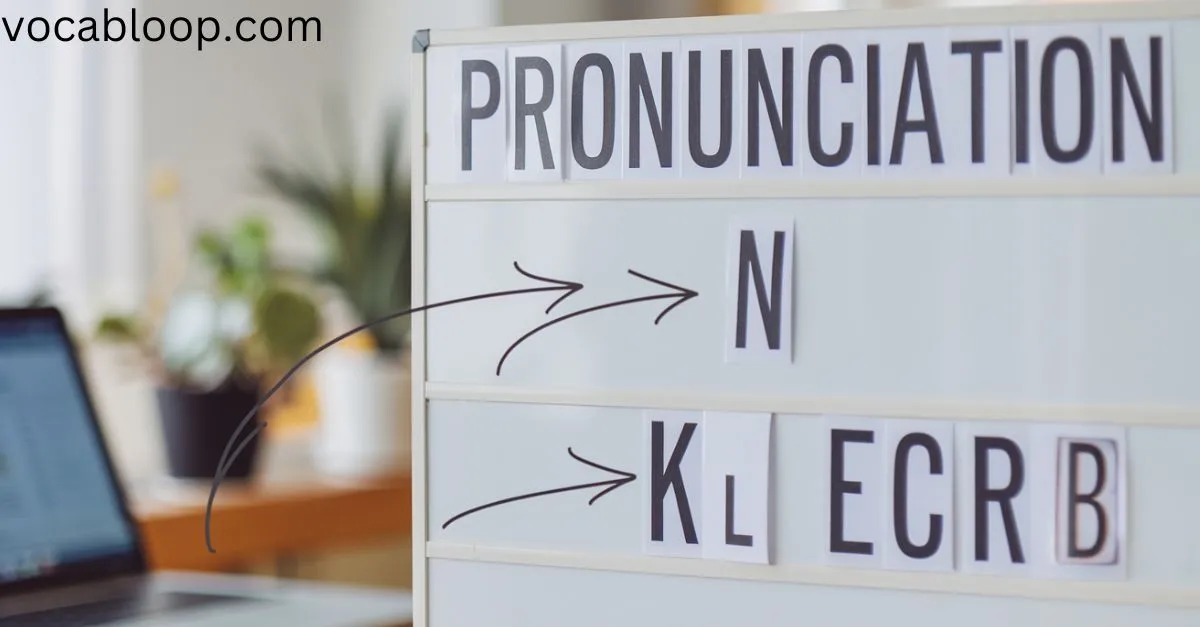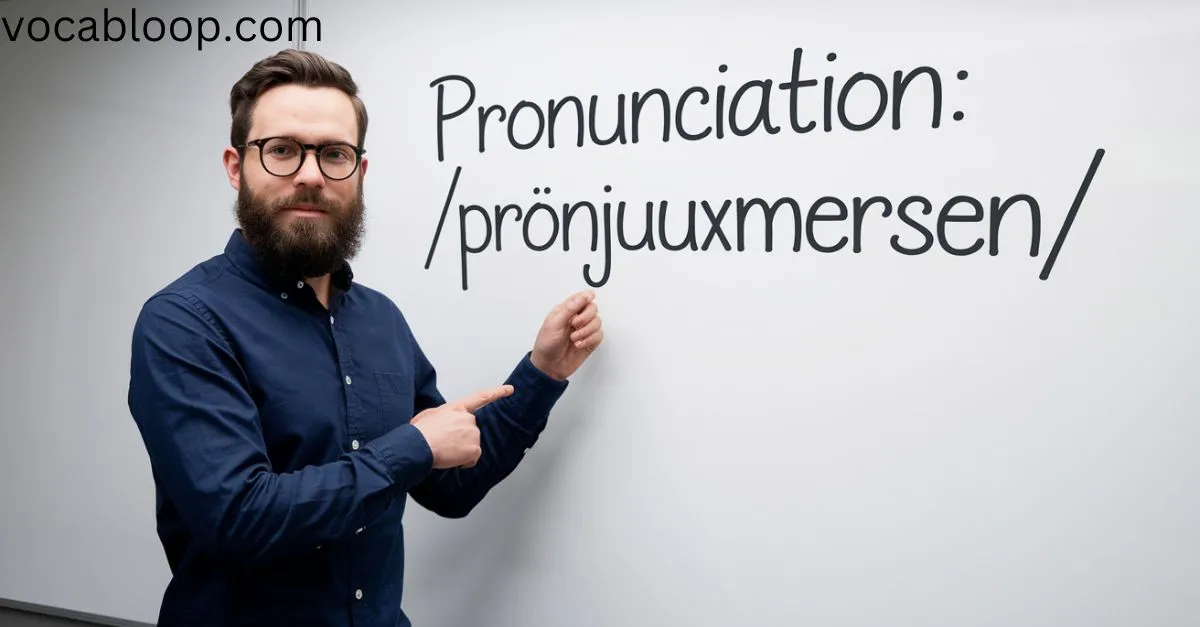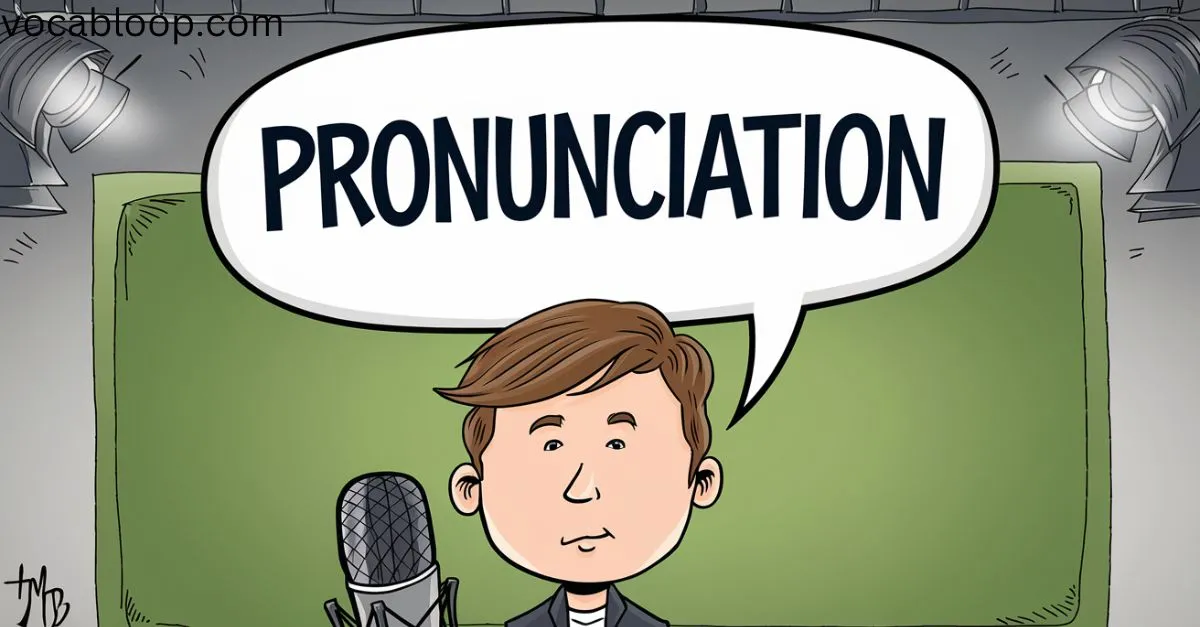Language can be tricky, especially when it comes to spelling. Many people often wonder whether to use “pronounciation” or “pronunciation”. This question has caused confusion for English learners and native speakers alike. Understanding the difference between these words is crucial for improving your English fluency and avoiding common spelling mistakes. Let’s dive deep into this topic and explore the right choice.
What Is Confusion Pronounciation or Pronunciation?
The confusion between these two spellings stems from the natural way people interpret sounds in English. The word “pronunciation” comes from Latin roots, but its verb form, “pronounce,” adds the letter “o.” This leads many to assume the noun should also include the “ou” sound, creating the incorrect “pronounciation”. This mix-up is one of the most common language quirks in English.
Additionally, English spelling rules can be inconsistent. This contributes to the difficulty in mastering the correct spelling. Many learners struggle because English borrows from different languages like Latin and French, which complicates the rules.
Is the Pronounciation Word Correct?
Definition:
The word “pronounciation” is not listed as a correct entry in standard dictionaries. It is regarded as a common misspelling rather than an accepted alternative to the word “pronunciation.”
This error typically arises because people assume that the noun form of “pronounce” should follow the same pattern as other words ending in “-tion.” However, “pronounciation” has no place in formal written or spoken English.
Meaning:
Despite its frequent use, “pronounciation” does not hold any valid meaning in English. It is simply an incorrect variation stemming from the verb “pronounce.” The mistake is often made due to the tendency to add “ou” to words that share similar sounds or origins, such as “annunciation” or “association.” “pronounciation” has no etymological basis or legitimate linguistic history, making it a spelling confusion that should be avoided.
Usage:
You might come across “pronounciation” in casual or informal writing or hear it spoken by non-native speakers or learners of English. However, this usage is incorrect. For instance, a sentence like “His pronounciation was excellent” contains a spelling error that can confuse the reader or listener.
It’s important to recognize that while this misspelling may be common in everyday speech, it is not acceptable in professional or academic contexts. To ensure clarity and accuracy, always use “pronunciation” in its correct form.
Is the Word Pronunciation Correct?

Definition:
“Pronunciation” is the correct noun form derived from the verb “pronounce.” It refers to the way a word or sound is spoken or articulated, emphasizing accurate speech. It is widely recognized and used across various contexts, from linguistic studies to everyday conversation.
Meaning:
The word “pronunciation” has its roots in classical etymology, particularly the Latin term “pronuntiatio,” which means “to announce” or “declare.” This classical origin highlights its deep ties to language development, particularly in the way words are spoken and understood.
“Pronunciation” refers not only to how words are said but also to the correctness of that articulation, making it a crucial aspect of clear communication.
Usage:
In proper English, “pronunciation” is the accepted term used in both formal and informal speech. For example, the sentence “Her pronunciation of French words is impressive” is a clear and accurate use of the word. “Pronunciation” is commonly found in academic settings, language learning resources, and even professional presentations, where precise articulation is valued.
Whether in teaching phonetics, conducting speech therapy, or simply discussing how to pronounce words correctly, “pronunciation” remains the go-to term. It’s essential to ensure the correct spelling to avoid common mistakes and maintain linguistic accuracy.
Quick Summary
| Feature | Pronounciation | Pronunciation |
| Spelling | Incorrect | Correct |
| Meaning | Does not exist formally | Refers to speech clarity |
| Usage | Informal and mistaken | Formal and standard |
The table above makes it clear why “pronunciation” is the only correct option.
Pronounciation or Pronunciation as Parts of Speech
“Pronunciation” functions as a noun and plays a key role in describing the clarity or style of speech. It is derived from the noun and verb roots in Latin. In contrast, “pronounciation” does not hold any place in grammar or linguistics. Focusing on the right form can help you boost language abilities and refine your speaking skills.
Pronunciation of “Pronounciation or Pronunciation”

The correct pronunciation of “pronunciation” follows the IPA symbols /prəˌnʌn.siˈeɪ.ʃən/. Notice the absence of the “ou” sound present in “pronounce.” This difference stems from the short /ʌ/ sound in the middle syllable, which aligns with the phonetic rules of English.
Side-by-Side Comparison Pronounciation or Pronunciation
The table below highlights key differences between these terms:
| Aspect | Pronounciation | Pronunciation |
| Phonetics | Mispronounced | Properly follows IPA |
| Roots | None | Latin origin |
| Commonality | Mistake | Widely accepted |
Which One Is More Acceptable: Pronounciation or Pronunciation?
“Pronunciation” is the only correct form. It is widely accepted and used in all forms of communication, from casual conversations to academic writing. On the other hand, “pronounciation” is a spelling mistake that often arises from confusing the verb “pronounce” with its noun form. The incorrect use of “pronounciation” can cause confusion, especially in formal contexts.
Language experts in English phonology stress the importance of using proper pronunciation to communicate clearly and effectively. Mastering the correct spelling not only improves your speech but also ensures that your language skills are taken seriously in both professional and personal settings.
Pronounciation in British English and American English
“Pronounciation” is incorrect in both British and American English. Although its usage might appear more frequently among learners or in informal speech, it is not recognized in standard grammar in either dialect. This spelling error can be attributed to the complexity of English spelling and pronunciation rules.
Since the English language borrows from many languages, it can be difficult to navigate all the rules, especially when it comes to pronunciation. However, it’s essential to remember that both British and American English follow the same spelling for the correct form: pronunciation.
Pronunciation in British English and American English
The spelling of “pronunciation” remains consistent in both British and American English. However, there may be slight differences in phonetic sounds between the two dialects. In British English, the second syllable of “pronunciation” tends to be pronounced with a more emphasized vowel sound, making the word sound a bit different from the American version, where the emphasis may be softer or less pronounced.
Despite these differences in sound, the correct spelling of the word is the same in both dialects. Understanding these pronunciation differences can help in adapting to both British and American English.
Common Mistake and How to Avoid Them
The most common mistake is adding the “ou” to “pronunciation,” mistakenly creating the word “pronounciation.” This happens because the verb “pronounce” contains the “ou” sound, leading people to think the noun form should follow the same pattern. To avoid this common mistake, it’s important to remember that “pronunciation” follows a different linguistic pattern.
Focusing on the correct enunciation and practicing the word repeatedly can help reinforce its proper spelling. Additionally, reviewing the pronunciation rules for similar words can further aid in preventing this error.
Trick to Remember the Difference: Pronounciation or Pronunciation
A simple trick to remember the correct spelling is to focus on the sound rather than the spelling. The word “pronunciation” doesn’t contain the “ou” in the middle, unlike its verb counterpart, “pronounce.” When you say the word, emphasize the short /ʌ/ sound in the middle syllable rather than trying to pronounce it with an “ou” sound.
Practicing this phonetic pattern will help you recall the correct spelling. Additionally, saying the word slowly and breaking it down into smaller parts can reinforce the proper pronunciation and prevent the spelling confusion.
Origins of Pronounciation or Pronunciation
Pronounciation
The term “pronounciation” lacks any legitimate linguistic origins or historical usage in the English language. It is a spelling error that likely arises from overgeneralization based on the word “pronounce.” Unlike its correct counterpart, it has no foundation in Latin root words or formal grammatical history.
Its frequent appearance is due to the assumption that the verb and noun forms share identical structures, which is common in English spelling mistakes and language mix-ups.
Pronunciation
The word “pronunciation” derives from the Latin term “pronuntiatio,” rooted in the verb “pronuntiare,” meaning “to announce” or “declare.” This classical etymology reflects the deep Latin influence on the English language, especially in formal and academic contexts.
Its history underscores the consistency in linguistic patterns drawn from Latin, where the noun form omits the “ou” found in the verb. This highlights its evolution as part of English language etymology.
Synonyms of Pronounciation or Pronunciation
Pronounciation:
- Incorrect words such as “pronouncation” or “pronounciating.”
Pronunciation:
- Articulation
- Enunciation
- Speech
- Accent
- Diction
- Utterance
- Verbalization
- Intonation
- Modulation
- Phonetics
Sentences in Daily Usage of Pronounciation or Pronunciation
Pronounciation (Incorrect Examples):
- “Her pronounciation of difficult words impressed everyone at first glance.”
- “He worked hard on his pronounciation but still made mistakes.”
- “The teacher corrected my pronounciation during the lesson.”
- “She struggled with the pronounciation of the French phrases.”
- “Their pronounciation of medical terms was slightly off.”
- “The app promises to help improve your pronounciation quickly.”
- “The pronounciation of this word always confuses me.”
- “I need to work on my pronounciation before the presentation.”
- “His pronounciation of scientific terms wasn’t entirely accurate.”
- “The debate over pronounciation versus pronunciation never ends.”
Pronunciation (Correct Examples):
- “Her pronunciation of complex words was flawless.”
- “He received praise for his clear pronunciation in the speech.”
- “The app helps users learn correct pronunciation effectively.”
- “Mastering pronunciation is essential for clear communication.”
- “Their pronunciation of foreign names was spot-on.”
- “I improved my pronunciation by practicing with a native speaker.”
- “The pronunciation of this term varies between dialects.”
- “Good pronunciation can make a huge difference in public speaking.”
- “She used an online tool to refine her pronunciation skills.”
- “Learning proper pronunciation helps boost your confidence.”
FAQs
Why is “pronounciation” incorrect?
It does not follow the spelling rules of English.
What is the Latin root of “pronunciation”?
It comes from “pronuntiatio.”
How can I improve my pronunciation?
Practice with pronunciation tips and learning phonetics tools.
Is “pronounciation” accepted in casual speech?
No, it is always a mistake.
Why does this mix-up occur often?
It’s due to the connection between “pronounce” and “pronunciation.”
Conclusion
Understanding the distinction between “pronounciation” and “pronunciation” is essential for mastering English. The incorrect form, “pronounciation,” arises from common spelling mistakes, often due to confusion with the verb “pronounce.” By focusing on the accurate spelling of “pronunciation,” you can avoid these common errors.
Studying the linguistic history and origin of words helps reinforce correct usage. Regular practice with educational tools and phonetic exercises will refine your speaking skills, boosting your confidence and enhancing communication. Correct pronunciation is key to clear and effective expression in any language.

Alex Hormozi is a seasoned blogger at Vocab Loop, known for his deep insights into language, vocabulary, and grammar. With years of experience in writing, Alex shares practical tips and effective strategies to help readers improve their linguistic skills and enhance their writing abilities.

